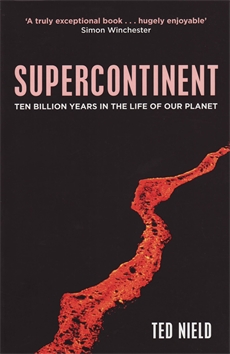 “The four-dimensional complexities of our happy little planet – “earth’s immeasurable surprise” – are made elegantly accessible by Ted Nield in this truly exceptional book. At least until the next major discovery it deserves to become the standard work, ideal for students of the subject, and hugely enjoyable to those for whom the world remains an unfathomable enigma.”
“The four-dimensional complexities of our happy little planet – “earth’s immeasurable surprise” – are made elegantly accessible by Ted Nield in this truly exceptional book. At least until the next major discovery it deserves to become the standard work, ideal for students of the subject, and hugely enjoyable to those for whom the world remains an unfathomable enigma.”
Simon Winchester
Ten billion years in the life of our planet. That’s the subject of this first Podularity podcast. And all in a little over 17 minutes… Alert readers may already object that it’s impossible to cover 10 billion years, as the Earth is only six billion years old. (If you are objecting that the Earth is a great deal younger than that, then this podcast is probably not going to appeal to you.) However,Ted Nield’s new book, Supercontinent, looks not only deep into the past by examining the geological record, but also peers into the planet’s far-distant future.
The book tells the story of the planet by tracing what Nield calls ‘the grandest cycle in all nature’ – this is the Wilson cycle of break-up and formation of all the Earth’s land-mass in a single, gigantic supercontinent. Each cycle takes at least half a billion years to complete. (You can find amazing reconstructions of previous supercontinents at Chris Scotese’s Paleomap Project: http://www.scotese.com/newpage13.htm. You may find these interesting as you listen to the podcast.) Nield also tells the stories of the men and women who have sought to decode its history from its rocks. They turn out to be quite a bunch. They include mystics and madmen (and -women) as well as scientists.
One of the great attractions of the book is Ted’s gift for vivid images and metaphors. Here he is explaining how mountain ranges form:
‘Oceans can open and close, like a carpenter’s vice, more than once. Imagine that you open a vice, put the carpenter’s lunch (cold lasagne) into it and squeeze it tight. The lunch will ooze out and up, forming a mountain chain, which we shall call the Lasagnides. You then leave it until the lasagne has gone hard before opening the vice again. By now agents of erosion – mice – have scoured the once mighty Lasagnides back to bench level; but their roots, within the vice itself, remain. If you now reopen the vice to start the process again, some of those old Lasagnide remnants will stick to one jaw and some to the other; but the vice reopens along the same basic line. That is how you get some parts of the same mountain chain in Europe and others in America.’
Nield’s book begins with a space traveller visiting Earth in the far-distant future. The planet he finds is almost unrecognizably different from the one we inhabit today. Our conversation began with Ted describing that future Earth…
Podcast: Play in new window | Download

Pingback: 34. After we’ve gone